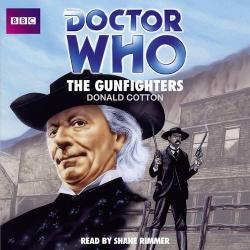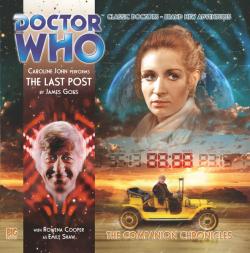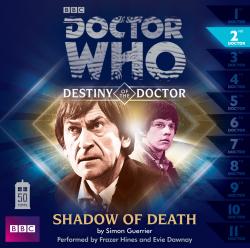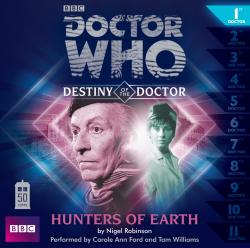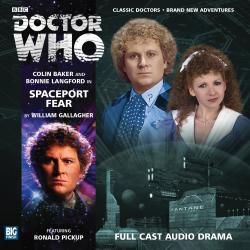Destiny of the Doctor: Vengeance of the Stones
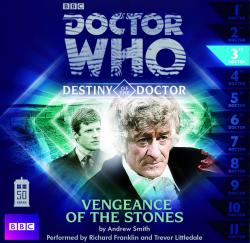
Destiny of the Doctor: Vengeance of the Stones
Released by AudioGo
Produced by Big Finish
Written by Andrew Smith
Directed by John Ainsworth
Released: March 2013
"This is the serious bit - listen. Trust me on this . . . "
We're three months into AudioGo's Destiny Of The Doctor, and what with the monthly (or "Doctorly") schedule that brings us to the era of Jon Pertwee with Vengeance Of The Stones. What's perhaps most compelling about this third instalment is that it takes place in between Seasons Seven (1970) and Eight (1971) of the classic era, with the Doctor yet to meet Jo Grant, and Mike Yates yet to join UNIT as a captain. The latter plot strand of Yates's enlistment is an element of the character's arc never dealt with on-screen, so naturally fans will get a kick out of discovering how the tale of this beloved UNIT character began.
What's more, Vengeance does perhaps the best job yet of channelling its respective era of Doctor Who. Richard Franklin's Third Doctor impression is smashing, replicating Pertwee's aristocratic swagger and alien authority with the same alarming realism as Frazer Hines possessed in his portrayal of Patrick Troughton's incarnation last month. Franklin is joined by Trevor Littledale, who brings to life the mysterious aliens unearthed at a site of ancient stone circles in the north of Scotland. The premise of the story echoes recent adventures such as The Pandorica Opens and The Sarah Jane Adventures' Enemy Of The Bane, although strangely enough for a range seemingly intending to bridge the 50 years and various eras of Who references to those stone-themed tales are curiously absent here.
Typically enough, the audio's narrative is pretty representative of what fans would have come to expect from Pertwee's early years in the role as the Time Lord. At this point in his timeline, the Doctor is still trapped on Earth, so his adventures have a grounded feel to them in that he's using the technology of the human planet and his own wits, rather than creating a wibbly-wobbly timey-wimey solution as his eighth successor might currently do in these kinds of situations. Whether listeners will find that grounded sense of Earth-bound adventure works to the detriment of a purely science-fiction franchise in audio format will be a matter of personal preference, yet this reviewer has no doubt that Third Doctor fans will feel right at home.
Where there are perhaps more universal shortcomings with Vengeance, though, starts with the lack of ambition in its narrative. Whereas Hunters Of Earth and Shadow Of Death both did decent-to-great jobs of innovating on their respective eras of the show, Vengeance almost feels too much like a Pertwee tale, limited to much the same basic plot structure and chance-driven climax as we would see in many of the classic DVDs. Perhaps for some listeners who were there between 1970 and 1974, this will suit the bill perfectly, but even as someone who's tried to accustom themselves to the styles of each era of the show since joining the fanbase in 2005, this reviewer couldn't help but feel a lingering sense of boredom settling in during the latter half of this piece.
It doesn't help, either, that the Destiny story arc elements are at their absolute most basic and rudimentary here. Again, both of Vengeance's two predecessors at least featured references to the days that might come for the Eleventh Doctor in multiple scenes, yet here we have a third era-representative crossover with a future incarnation of the Time Lord that feels rather shoe-horned into proceedings. You'd have to hope that the various cameo appearances are going to lead to a substantial finale in November's The Time Machine, but particularly here it felt as if devoid of the extra scene at the beginning of the third act, Vengeance could have been just another rather average Big Finish classic Doctor release.
Ultimately, it's unlikely that those more significant detriments in this instalment are going to be of real hindrance to Pertwee fans here. Vengeance Of The Stones is still a fine addition to the Destiny Of The Doctor range, with Franklin's superb vocal work and the prominence of the era-representative storyline both doing wonders for the overall quality of the release. A word of caution and reassurance, then: those followers of the Destiny arc looking for concrete core developments will be left wanting, yet anyone who's been waiting for Vengeance to land and seal the 1970-1974 era of Who fully through Mike Yates's enlistment will at least find closure and excitement to be had throughout this fairly strong production.
